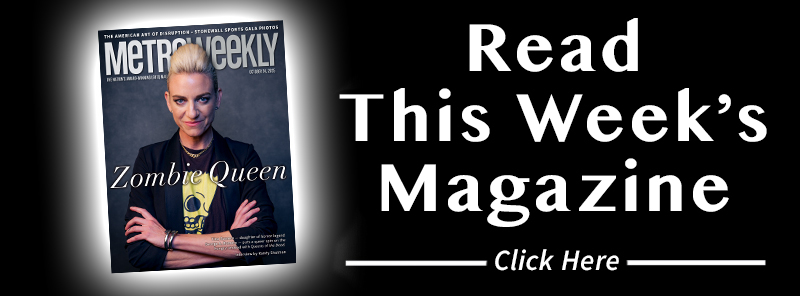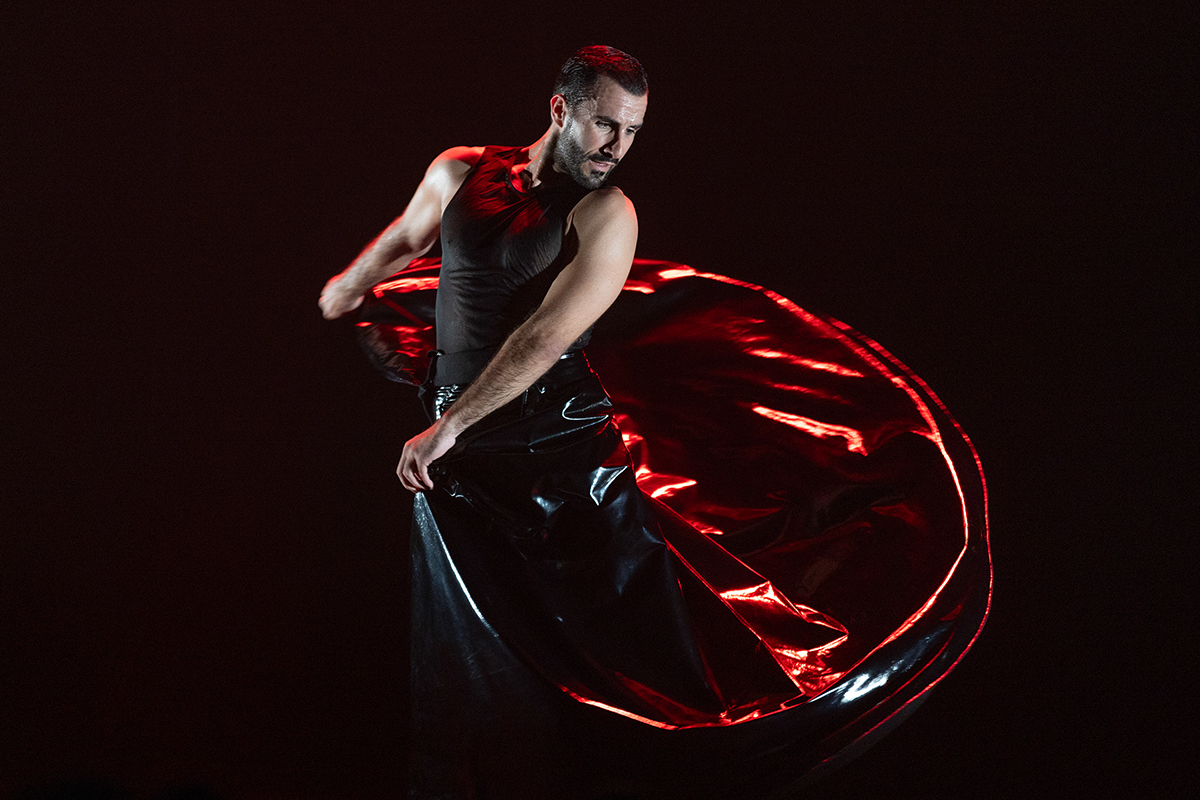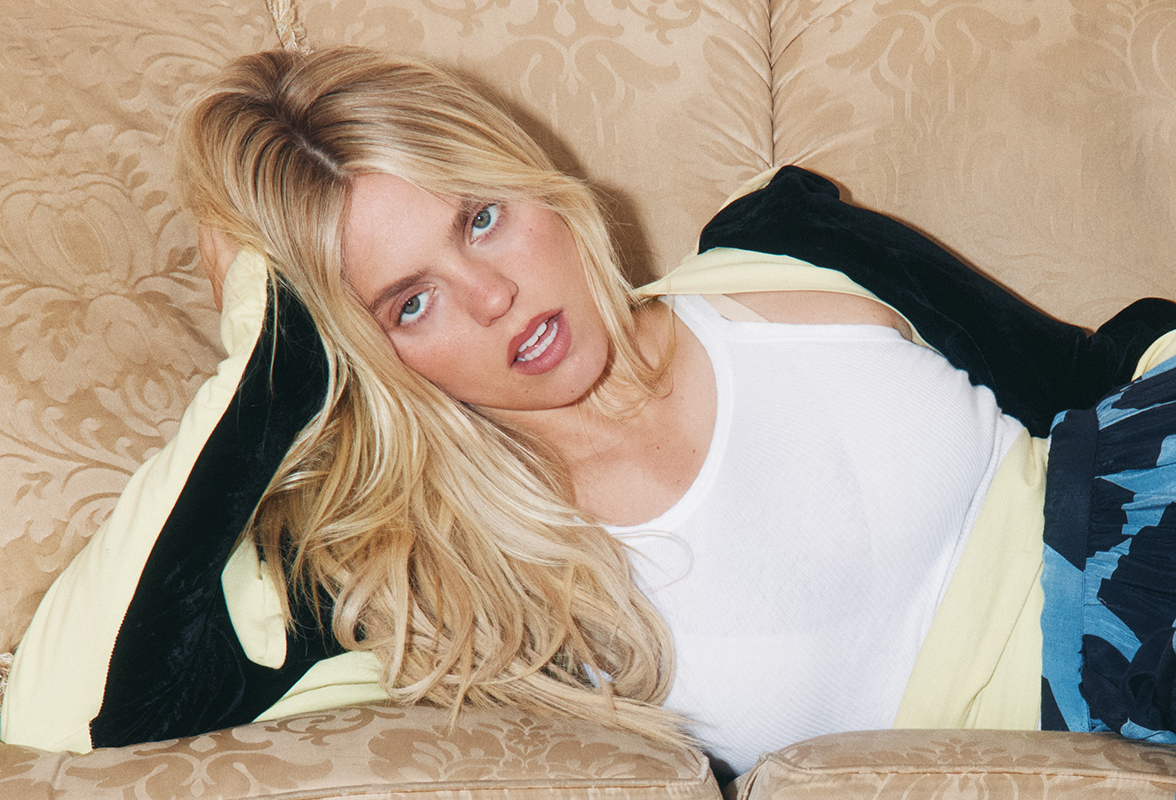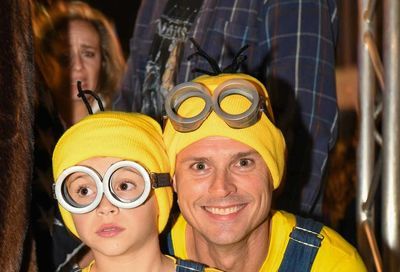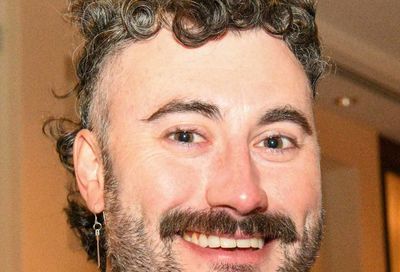Bob Mould: Independent Spirit
Rocker Bob Mould talks about his new album, popular blog and hit gay DC party, Blowoff
When Bob Mould moved to Washington three years ago in June of 2002, he was at a crossroads in his life. Recently fully out, the former member of ’80s indie-pioneers Hüsker Dü and leader of the ’90s pop-driven phenom Sugar had grown restless, disaffected, uncertain of his next move.
 Bob Mould |
“I spent the summer of 2002 trying to find people to be friends with,” he says over coffee one morning at Health Bar on U Street. “Somebody needs to tell anybody who is thinking of moving to D.C. — don’t do it in the summer. There’s nobody here. Everyone’s at the beach.”
He made friends soon enough, among them fellow indie artist Rich Morel, with whom he forged a partnership in the popular gay alterna-dance party Blowoff. While some might consider it unusual to find a musician of Mould’s stature spinning, shirtless, to a crowd of two hundred sweaty gay men in a side room in the bowels of the 9:30 Club, for Mould the experience has been liberating. And his interest in remixing and electronica in general has helped shape the sound of his new solo album — Body of Song — a vibrant, complex, musically stunning work that can be considered among his best.
Mould has also found popularity in the blog arena, and his Boblog at www.bobmould.com, coyly subtitled “a quiet and uninteresting life,” marks the progress of anything but.
Still, it’s a different life from someone who spent years on the road touring, playing to thousands of fans.
“There’s something really bizarre about standing in front of 60,000 people performing,” says Mould. “It’s very surreal, like it’s not even happening. There’s no way to connect with anybody. The other guys in the band are a hundred feet away and you can’t hear a thing and you wonder ‘Are we even playing the same song?’
“The money and the success are great,” he continues. “It affords an easy lifestyle. But I’m completely content now. I’ve got plenty.”
METRO WEEKLY: You were associated with two very well known, successful alternative bands, Hüsker Dü and Sugar, but you’ve also been a solo act for several years. When you decide to go solo, is there anxiety over wondering whether or not you can pull it off?
BOB MOULD: The first time I did that — when I left Hüsker Dü in the beginning of 1988 — I was basically left with a huge hole in my life. The prior eight years had been nothing but that band. I was at a loss as to what to do. I started writing songs and poetry and then re-learning the guitar for myself, not with anything in mind. I knew in the back of my mind that ultimately it would be a solo record, but for that year it was unnerving. I was up on a farm in north Minnesota, pretty isolated from everybody. I had no idea if I was on track, I wasn’t letting people hear what I was working on. But it turned out well.
With Sugar, there wasn’t any diplomatic equity [as there was with Hüsker Dü]. I was the leader, I wrote the songs, I called the shots. David [Barbe] and Malcolm [Travis], the other two players, brought an immense amount of talent to it, but I had a vision of what I wanted it to be and it took its own course. So returning to the solo format [after Sugar disbanded] in ’96 was not that hard a stretch. The big difference between putting a band moniker on something and having my own name on something is the level of intimacy in the writing. When it’s a singular name, when I’m taking ownership of all the thoughts, I think I’m a little freer to get more personal with it.
MW: Despite your years of success, is it hard to find a record company to work with?
MOULD: It’s tougher as time goes on. I don’t think I have mass appeal anymore. I think I have a specific audience, a core audience of people who have followed my guitar career from the beginning. I think there’s a potential to reach new audiences, but the business has changed so much. I think a label looks at me and goes, ”Oh, he’s a career artist. He probably has a cap on sales.”
Record companies like to take crapshoots. They like to find 20-year-old kids who can possibly break through to the other side. With people in my position, it’s harder. Having said that, there were a lot of independent labels interested in working with me and I held all of them up until I had the record almost finished. I didn’t want to get into a relationship with a new label where they would have input. I wanted to hand them a finished work.
MW: You’re supporting Body of Song with a tour.
MOULD: A whirlwind tour. We’re going through a handful of capital cities in Europe in September. We come back here in late September and do like 17 shows in the U.S. in major markets. We start up on Sept. 22 in Chapel Hill. We have a show at the 9:30 Club in D.C. on Oct. 7 and it finishes up on Oct. 15 in Los Angeles.
We start rehearsing in a few weeks. The band will have Brendon Canty on drums, Rich Morel on keyboards and an old friend of mine, Jason Narducy, on bass. These are three really good friends of mine, they’re great musicians. We’re just going to have a party.
MW: Do you find touring enjoyable?
MOULD: I love to play music. The six hours a day in the car gets a little tiresome. I’m 44 — I’d rather be at home reading or writing or being with my friends or working out. Not sitting in a car. The dashboard is like watching the hourglass, staring out at it and watching the sand roll through. It’s like ”Are we there yet? Can I find something to do?” But it’s an honest living.
MW: The addition of electronica to your overall sound is a relatively new development for you. I’m sure there are a lot of artists in your style of music who wouldn’t embrace it as you have.
MOULD: No, they hate the stuff.
MW: So what’s different about you? What opened your mind to it?
MOULD: A couple of things. I’d been working with guitar music for over 20 years and I saw the bastardizing of my art form. By the late ’90’s it had grown tired and I was tired of being part of it. I needed a challenge because, to me, it had gotten stale. That, running concurrent with me at 38 getting out in the [gay] life for the first time in New York, spending time in the West Village in Chelsea and at clubs and at the gym, at fashionable events. It was my emerging — and the [electronica] music was the soundtrack. It was all around me. It was just getting into my head and I wanted to be part of that, too.
MW: And Blowoff was your outlet for trying it out.
MOULD: Blowoff was like an accident and a necessity at the same time. The accident was when Rich [Morel] and I were working at his studio. One day I looked over and saw this box in the corner. I said, ”What’s in the flight case?” And he said, ”[Friends] bought me this DJ rig. They want me to learn how to DJ. I hate DJs.” I said, ”Let’s look at it.” So we got it out, and I’m looking at it and thinking, “Okay, we’re here, it’s fall, you don’t get out of the house much, I don’t have many friends. You’ve got this DJ rig. It looks easy. Why don’t we just throw a party and see if anybody shows up?” And he was like, ”We could do that. My band plays at Velvet Lounge. I’ll bet I could talk to the owner there.” He said, ”Yeah, come in and do a Sunday night.” So I made a little flier and went around the neighborhood. If I saw somebody who had a rock shirt on or something I would just go up and say, ”Hey, we’re throwing this party. This card gets you in free.” And people showed up. We were doing it once a month and by June of ’03 it was huge.
We went from once a month to once a week when we moved to the 9:30 Club, which has been our home base for a couple of years now. Once a week just about killed both of us because you can’t come up with that much new music. We scaled it back to Saturdays twice a month last fall and that seems to work. We do it by word of mouth. People go to the website blowoff.us and get on the mailing list. We send them an invite on a Tuesday and then it happens on Saturday.
 |
MW: The core crowd is muscle bears.
MOULD: It’s muscle bear, muscle cub, some 17th street guys, some gals, some curious straight people. But yes, it’s a music event mostly inhabited by guys in their 30s and 40s who are generally just normal guys. It’s not a high fashion event. It’s not a perfumed, cologned, over-dressed crowd. It’s pretty much T-shirt and jeans.
MW: Between the two of you, how do you decide what to play?
MOULD: Just stuff we like. It’s gone through a lot of different things. I’ve gone through playing down tempo to mash ups to Indie rock to pop house stuff. Rich has stayed pretty true to his classic rock roots and his progressive house stuff. He’s a great remixer — in addition to his band, that’s what he does for a living. He has three songs in the top 20 now.
MW: What has DJ-ing brought to you as a musician?
MOULD: It keeps me informed, it keeps me fresh, it keeps me interested. Because if I didn’t have to go listen to other people’s music however many hours a week I do to get ready for this, I probably wouldn’t have my finger on what’s going on. So DJ-ing is one of the things that’s been added to my life lately that’s kept me young and fresh and in the loop. The other thing is the blog. That was a lifesaver.
MW: How so?
MOULD: In the beginning of ’04, I was getting stuck for words in my writing. I had a lot of friends who were blogging so I just decided to start a blog, just started writing and goofin’ and telling people what I was doing, infusing politics and culture and music and images I liked into it. And what that did was take away whatever bits of writer’s block I was having because I had to write to feed this thing.
I have a couple of rules I use for the blog. Before I ever publish anything I always look at it and ask, ”Am I making a fool out of myself” and ”Am I hurting any of my friends?” Those are the two things I’d prefer not to do. Being older than most bloggers I always joke with people that I’m like the Andy Rooney of bloggers.
MW: Over the past few decades, several DJs have gotten to near-superstar status. Critics say they’re not involved in a fully creative act and simply have made it on the work of the artists they remix.
MOULD: I think there’s more to DJ-ing than meets the eye. I don’t think it’s as intensive as the true creative process of composition. But having done a lot of remixing now, there’s a lot of creativity and a fair amount of work that goes into it. Granted, there’s a formula that everybody adheres to when doing club remixes and it’s only when somebody comes up with a really new innovative approach that we get any progress. Otherwise it gets stuck in place.
MW: Do you feel that the greater accessibility of music through the Internet has been a good thing, piracy concerns notwithstanding?
MOULD: Yeah, I think it’s better for everybody. And because it’s not controlled by large media concerns, because it is democratic and free, it’s almost like now we’re narrowcasting. There was a reason the word broadcast is what it is — it was always content for the broadest audience possible. A lot of these streaming stations can address a more specific audience or reflect a more specific aesthetic than the [broadcast radio] DJs or the station managers adhere to. I think that’s really, really good because I know where to put my work now. I don’t need to worry about commercial radio. If commercial radio gets on it because they like it, that’s great. But I can go to KEXP in Seattle, which is a huge Internet concern, and they love my music, so they’re going to promote me. Or WXPN in Philadelphia because people listen to ”World Café” on the Internet all the time. I can identify my audience easier and focus more on the people I know will support the work.
 |
An interesting adjunct that’s happened in the past 18 months is these MP3 blogs [by] huge music fans who take it upon themselves to post MP3s for evaluation, which means for download for free. But they write very compelling reasons why you should listen to the music they post and they often supply links to the artist site and to Amazon to buy the music.
MW: Still, there’s the issues of rights. The music industry calculates billions of dollars have been lost.
MOULD: Tons in immediate revenue. But you have to look at it as building up your brand. You have to give something away to get people in the door these days. That’s business now — you gotta deal with the model. It’s just trying to control how much you give away, which is hard with the Internet because if somebody gets the album and they want to upload it to a service, it’s gone. What I try to do is emphasize to people how much it costs me to put a record together and if you like it, there’s a value to it. And you try to reward the person who brought this value to your life. Young kids don’t get that. They don’t want to hear about that.
MW: I think they eventually come around.
MOULD: [Laughs.] Yeah, they do, when they realize that they have to leave their parents’ house and pay rent and all of a sudden have to work.
MW: Is it harder to make a living with the Internet in the equation?
MOULD: It’s harder to make it on record sales. The record is a loss leader to get people to shows. To me, the records are sacred, they’re documents, they’re snapshots of time. But the reality is they’re a way to get people excited about coming to see you perform. And to buy T-shirts. You can’t download a T-shirt.
MW: How has your life changed since finally getting involved in the gay life over the past few years?
MOULD: A lot. I wish it hadn’t taken me so long, but I guess that was part of being driven by my career. My career was not in a gay-friendly field per se. Indie rock is gay tolerant but it’s not gay friendly.
MW: Do you feel as though you lost any fans as a result of coming out?
MOULD: Not any real fans. I might have lost casual fans, but you always lose casual fans due to one thing or another. Because you make a record they don’t like, or you wait too long to make another record, or you tell them you’re a homo. It can happen for any number of different reasons.
MW: There’s an upsurge of gays in the indie movement — it’s become a fairly large subset.
MOULD: There is a big gay indie scene. There’s a lot more out artists now. There’s me, there’s Rufus Wainwright, [REM’s Michael] Stipe, finally. But what is he? The public perception is still very vague.
MW: It’s interesting that Wainwright has achieved popularity with such gay-centric lyrics.
MOULD: But his audience is specific. He has a broad gay audience. He does not have a broad commercial audience. I think I have a broader commercial audience and a smaller gay audience than him.
With the gay audience, there’s a younger generation and it’s bubbling up quickly. I see a lot of them at Blowoff and at other events here in town, like Taint or at Bliss. There’s a lot of queer indie events happening and everybody is galvanizing now, realizing that they’re not alone in this thing. For as tough as things are right now with the red state, blue state, civil union, gay marriage, whatever, there’s still a lot of progress. Politics moves slowly. It will all work out.
Advertisement
|
MW: Do you find time to date?
MOULD: I have a lot of really important people in my life right now on a lot of different levels. Dating is a loaded word.
MW: What would you prefer to call it?
MOULD: Getting together, hanging out, doing stuff, enjoying somebody’s company.
MW: Do you ever envision yourself settling down with one guy?
MOULD: Yep.
MW: How strong is that need?
MOULD: Very strong. I also have a need right now to get clarity in my own life, and I’m really busy this year, so I don’t see it happening soon, but it’s my nature. I’ve had two long-term relationships in my life, [the longest being] 14 years.
MW: Let’s get to the dirt. Tell me some secret scandal you’ve never told any other interviewer.
MOULD: I’m really straight. This is all a big charade to get press.
MW: It’s working.
MOULD: [Laughs.] It is. Look at all the press I’m getting. I don’t think there’s a whole lot of secrets. It’s funny, but some people [who respond to the blog] just cannot handle the fact that I talk about going to Whole Foods to get groceries. They’re horrified by it. Because it ruins some kind of illusion they have. They put me in a position that is unrealistic. They think I live in a mansion on a hill, and I snap my fingers and three scantily clad Marines go off and get my groceries. People get attached to the work and elevate me to some crazy status. But I still go to the grocery store. I still have to wait in line at the DMV.
MW: So no scandals…
MOULD: I’ve got to hang onto some stuff for the book.
MW: You mean there’s something here we’re not uncovering?
MOULD: A lot of stuff I could go further into detail on. But you’ll have to buy the book.
MW: Is there a book in the works?
MOULD: There have been a couple of book offers, so I just need to get my ass in gear and get it done. It would be very interesting. I’ve had a very interesting life so far. A lot of crazy twists and turns. A lot of good people in my life. And a lot of poisonous people in my life. It’s got all the earmarks of a great ”next summer on the beach” kind of read.
Body of Song ($16.98; Yep Roc Records) is available at area record stores, on Amazon.com and on iTunes. For tour updates and more info, visit www.bobmould.com.
|
Related Stories: Big Blowoff – Bob Mould and Rich Morel’s Blowoff moves upstairs and takes center stage at the 9:30 club (1/12/2006) Rock It Man – Local alterna-rocker Bob Mould prepares to appear at his very first Capital Pride (6/9/2005) Big Blowoff – An album and concert grows from Bob Mould and Richard Morel’s music-driven party (11/18/2004) Bob Mould – The MW interview (10/10/2002) |
Support Metro Weekly’s Journalism
These are challenging times for news organizations. And yet it’s crucial we stay active and provide vital resources and information to both our local readers and the world. So won’t you please take a moment and consider supporting Metro Weekly with a membership? For as little as $5 a month, you can help ensure Metro Weekly magazine and MetroWeekly.com remain free, viable resources as we provide the best, most diverse, culturally-resonant LGBTQ coverage in both the D.C. region and around the world. Memberships come with exclusive perks and discounts, your own personal digital delivery of each week’s magazine (and an archive), access to our Member's Lounge when it launches this fall, and exclusive members-only items like Metro Weekly Membership Mugs and Tote Bags! Check out all our membership levels here and please join us today!










